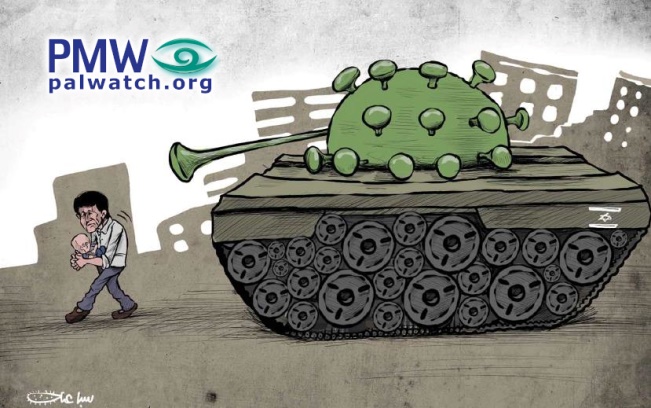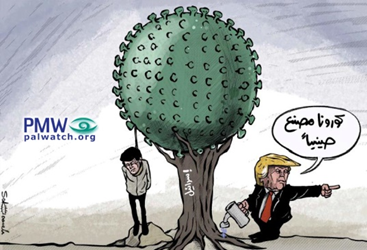The coronavirus has been, so far, a once-in-a-lifetime pandemic. By the time it's over, it could kill more than a million people worldwide--maybe. It could end up being the single greatest viral killer since the last great pandemic a hundred years ago (the 'Spanish' flu).
G-d willing, that won't be true.
This disease has struck most of the world. It threatens lives everywhere. It threatens economies everywhere. Few, if any, major countries have proven to be exempt from this killer.
Nations were not prepared for it. But as soon as it began, nations responded. Some responded better than others.
Every country had its own approach. Each nation designed its own coronavirus game-plan. In the Middle East, both Israel and the Palestinian Authority (PA) developed their own game-plans. In a short time, Israel became (somewhat) famous for the relative success of its coronavirus response (here). Even now, more than three months into the pandemic, Israel counts only 31 deaths per million population, one of the lowest death rates among developed countries.
The PA also had its own coronavirus game-plan. Much of that plan was familiar--lockdown, closed businesses, etc. But their game-plan also took on a new, perhaps unique dimension. It's dimension seen nowhere else in the world.
To put the corona pandemic into a context, the PA turned to a few, well-designed and sharply focused cartoons to show how it felt about this deadly killer. Here, now, for your entertainment, are a few examples of Palestinian creativity in the face of this particular pandemic.
Each cartoon below shows how the PA saw the corona risk. The first cartoon below is dated March 16, 2020. It appeared in an official PA daily called, Al-Hayat Al-Jadida (here). The cartoon presents an Israeli tank 'dressed up' as a coronavirus carrier. The cartoon shows the tank's main gun, also represented as a coronavirus shape, pointing at a Palestinian carrying a baby. The tank gun appears ready to 'shoot-to-kill' the innocent Arab. The message: Israel uses its military to kill the Palestinian people with the corona pandemic:

The second cartoon is dated May 4, 2020 (here). In this picture, the word "Israel" appears written in Arabic on a tree. The tree is presented as a 'coronavirus tree'--the shape of the tree's greenery appears in a 'corona' shape. This Israeli 'corona tree' is pictured 'killing' (hanging) a Palestinian; meanwhile, US President Donald Trump appears in the cartoon watering the tree and (in Arabic) says, "The coronavirus was created by China". The message: Israel is the coronavirus; Israel kills Palestinians--and Trump sustains the killer, Israel" (ibid):

Today's third cartoon is dated April 12, 2020. It shows an Israeli soldier shooting 'coronas bullets' into a PA village (the sign in the cartoon indicates this). The message: Israeli soldiers deliberately spread the deadly corona virus (from: here). The cartoon is from an official PA newspaper called, al-Hayat al-Jadeeda:
![Anti-Israeli propaganda and incitement in al-Hayat al-Jadeeda, the PA's official newspaper. An IDF soldier shoots "corona bullets" at Palestinian towns and villages [from an Israeli settlement] (al-Hayat al-Jadeeda, April 7, 2020).](https://www.terrorism-info.org.il/app/uploads/2020/04/word-image-1586863499368.jpeg)
These cartoons are vicious. They have nothing to do with the pandemic as a disease. Instead, they politicize the disease to demonize Israel. In an era when political correctness demands we respect one another, these cartoons should be disgusting to all who support such 'correctness'.
These cartoons are nothing more than primitive anti-Israel propaganda. They don't aim to support peace with Israel. They don't aim to reassure a population to be calm in the face of a deadly disease. They suggest instead the antithesis of 'peace'--and the antithesis of 'remain calm'. They reveal an obsessive dedication to incitement and hate against the world's only Jewish state.
They spew hate for the enemy. They give readers more reason to hate. Their subliminal message is simple: look at what the killer Jew-soldiers do to us.
Don't ask Israel why there's no peace. Ask the Palestinian Authority. Ask them, why do you print such obscenities?
Apparently, Palestinian leaders don't want peace with Israel. They want to destroy Israel--and these images above suggest what they have in mind: hate, not peace; demonization of--not cooperation with--the world's only Jewish state.